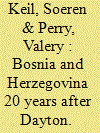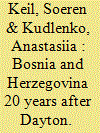| Srl | Item |
| 1 |
ID:
142273


|
|
|
|
|
| Summary/Abstract |
It has been 20 years since the Dayton Peace Agreement (DPA, official name: General Framework Agreement for Peace in Bosnia and Herzegovina) ended the bloodiest war in Europe since World War II. The violent conflict and the peace agreement demonstrated many of the tectonic changes that Europe and the world as a whole went through after the end of the Cold War. First, the wars highlighted the inability of the European Community (after 1993 European Union (EU)) to end the conflict, because of its Member States' disagreement on strategies and options, including the threat of military intervention, and the brilliant recognition and manipulation of this wavering by Balkan leaders. Reflecting this European discord, the DPA secondly highlighted the importance of the United States as the only remaining superpower capable of decisively intervening to end the violence in Southeastern Europe. The perception of a weak EU and a strong US willing to use military force would be further strengthened when NATO, significantly led by the US, intervened in the Kosovo war in 1999. Third, the war, and the consequent peace agreement also highlighted that the end of the Cold War by no means resulted in an end of violent conflict in Europe and beyond. Francis Fukuyama's thesis of the “End of History” and the victory of capitalism and democracy proved to be wrong, shortly after it was formulated. Finally, the war in Bosnia and the resulting peace agreement raised new discussions about the drivers of political violence and conflict, the role of ethnicity in democratic systems and institutional options available to overcome such wars and build and consolidate democracies.
|
|
|
|
|
|
|
|
|
|
|
|
|
|
|
|
| 2 |
ID:
142274


|
|
|
|
|
| Summary/Abstract |
This article will start with an analysis of the Dayton Peace Agreement, and assess to what extent it focused on peace-building, state-reconstruction and democratization. It will provide an overview of major peace-building, state-reconstruction and democratization initiatives by international and local actors in post-war Bosnia. Following the often-presented argument that ‘Dayton is a good peace agreement but a bad blueprint for a democratic state’, the article will ask if the Dayton Peace Agreement has failed in the consolidation of Bosnian statehood and the democratization of the country. In order to do this, an in-depth analysis of the current situation in terms of state consolidation and democratization will be given. The main argument of the article demonstrates that while the Dayton Agreement had some inherent weaknesses, actions by local elites and international state-builders also explain some of the current issues of the Bosnian state.
|
|
|
|
|
|
|
|
|
|
|
|
|
|
|
|